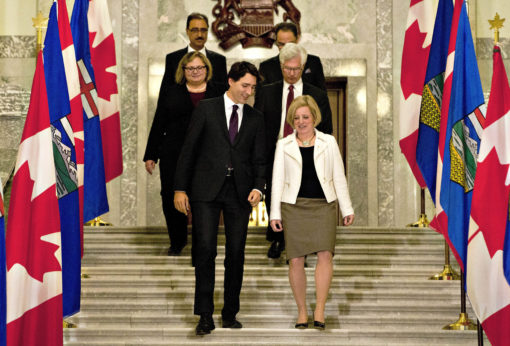
TORONTO—It was high drama when center-left Alberta New Democratic Party (NDP) Premier Rachel Notley drew out her pistols against British Columbia NDP Premier John Horgan, calling on Canadian Prime Minister Justin Trudeau and the federal government for back-up. The public was told this western was all about “the national interest,” and that was the reason the PM had to call the two Premiers down to Ottawa for a talking-to. It turns out the talking-to was mostly directed at Horgan, who formed a government after promising to stop the Trans Mountain Pipeline from being built to deliver bitumen from the Alberta tarsands to deep-sea tankers on the British Columbia coast.
Notley also got a talking-to however, for stating Alberta’s position represents the “national” interest. “Only the federal government represents the national interest,” Trudeau said, while hitching onto the Notley campaign and trying to get into the driver’s seat, with Jason Kenny’s United Conservative Party of Alberta in hot pursuit.
A provincial election is set for spring 2019 in Alberta, and the parties in the legislature all want to be first in defending the multi-national oil companies. Who will put up the most public money to guarantee huge profits to corporate shareholders?
Meantime, Texas-based Kinder Morgan, which will make billions from the pipeline, gave Canadian federal and provincial governments until May 31 to stamp out opposition, or else. The problem for the federal Liberal Party under Trudeau is that the opposition also includes Indigenous Peoples across Canada, along with environmentalists, scientists, and climate change experts, and a majority of Canadians concerned about climate change and Canada’s huge carbon footprint—a big part of which is the Alberta tarsands. These are the people Trudeau promised to listen to over the Big Money voices of the energy and mining companies.
This opposition is active and organizing on the ground, with protests, police, and arrests filling up the 6 o’clock news slot. A bad picture for the PM, who is still trying to rescue the remains of his promises to Indigenous Peoples for nation-to-nation relations, sovereignty, reconciliation, and mutual respect. Not to mention Quebec, which is also looking for a nation-to-nation relationship with the federal government, for sovereignty, and recognition of its national right to self-determination.
Both Trudeau and Notley know that mining bitumen and transporting it in pipelines is a bad idea, that filling deep-sea tankers and ships with it for export is another bad idea. But their governments and their election campaigns are financed by powerful multi-national corporations which make and break governments around the world all the time, including in Venezuela and the Middle East right now.
They’re putting the pressure on Canada too, with Kinder Morgan threatening to pack up unless the federal government shakes a leg and declares war on the pipelines’ widening list of opponents. Notley, and then Trudeau, responded by offering billions in public funds (federal and provincial) to keep the bitumen flowing and the pipeline afloat. The biggest assist has been given by Alberta’s social democratic NDP government, terrified by the prospect of being abandoned by Big Oil in Alberta, also known as “Texas North,” with an election ahead.

That raises the question of the federal NDP’s position on the pipeline. Federal leader Jagmeet Singh speaks about ‘democracy’ being a wonderful thing, with two NDP Premiers each keeping their promises to constituents. Singh has not spoken out against the pipeline, and avoided the recent protests when in Vancouver. What will his position be in the federal election? What will it be in Parliament?
In point of fact, nobody speaks for the public interest in Parliament today, with the possible exception of Green Party leader Elizabeth May, who was arrested at the pipeline protests in Burnaby that Singh didn’t attend. The problem with May is that working people can’t count on her party to defend their interests outside of environmental issues. And even there, the Greens support the development of alternative or green energy within the framework of for-profit corporate ventures, and not in the framework of public ownership and control of all energy and natural resources—which is in the national interest.
This unholy alliance of Liberal, NDP, and Conservative parties striving to meet the demands of the oil companies over wide public opposition says a lot about the current composition of the Canadian Parliament, and also why Trudeau was so fast to drop electoral reform from his list of promises after the last election.
The next federal election in Canada is 18 months from now. Voters need to remember what happened this year when, in the name of the “national interest” the three biggest parties in Parliament knifed the real interests of Canada and its people, conceding even more power to the multinational oil cartels.
In the meantime, most of the necessary participants needed to build a broad coalition of forces against the dictatorship of Big Oil are amassing in the struggle ahead against pipeline construction. What’s missing is the labor movement, confused perhaps by the corporate threat to existing jobs and the promise of future employment. But labor’s participation is vital to the whole struggle: for good jobs, for the environment, for Indigenous rights, and for unity of the labor movement across Canada.
A movement like that, aimed to curb corporate power and put the needs of people and the planet ahead of corporate profits, could set the agenda for the 2019 federal election. What a victory that would be for the nations and peoples of Canada—and beyond.
This article was first published in People’s Voice.










